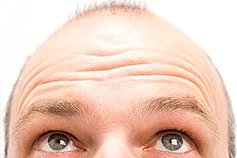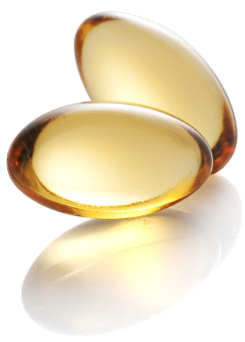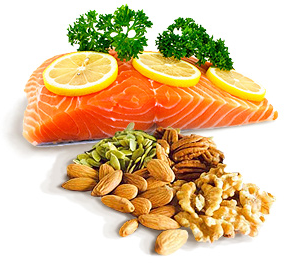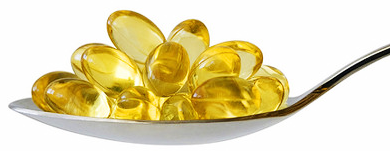Popular Articles
- Hair Loss Products for Men That Stop Balding
- Advecia Supplement Facts
- Medications That May Interact with Advecia
- Review of Rogaine for Women
- Vitamin Deficiency and Hair Loss - The Facts!
- 14 Vitamins for Hair Loss & Thinning Hair
- Receding Hair & Beta Sitosterol
- Biotin for Hair Loss - Should You Try it?
- 6 Amino Acids for Hair Loss
- Sugar Linked to Increased Hair Loss Risk
- More Articles ...
 How Omega 3 Helps With Hair LossIn This Article
Discover how Omega 3 helps with hair loss.
In order to have healthy hair and avoid hair loss, we need to make sure that we are getting enough of the right nutrients in our diets, including omega 3 fatty acids. Adding more of these fatty acids to your diet can help to prevent hair loss and even encourage hair to grow healthier, and at a faster rate. Omega 3 fatty acids have anti-inflammatory properties, which can help to open the hair follicles, promoting healthy hair growth. When the body is not getting the proper nutrients, the hairs that are lost regularly each day are not replaced easily, and hair loss may become a problem. Nutrition and Your HairDid you know that Omega 3 can help treat hair loss?
Omega 3 is an essential fatty acid, one of the fats that our bodies need in order to be healthy. It is also necessary for healthy hair, and without enough of the right nutrients in the diet, including Omega 3, unhealthy hair and hair loss can follow. What is Omega 3?
While ALA cannot be synthesized in the body, both DHA and EPA can be made from shorter-chain fatty acids although the conversion efficiency is rather low (5% in men; higher in women). Omega 3 fatty acids need to be ingested in humans either from dietary sources or supplements. They provide a wide range of health benefits including the treatment of cardiovascular disease, cancer therapy, improvement of neurological ailments, and as anti-inflammatory agents. Other disease conditions treated with Omega 3 include asthma, ADHD, bipolar disorder, diabetes, depression, Alzheimer's disease, lupus, osteoporosis, osteoarthritis, obesity, migraine, multiple sclerosis, high blood pressure, psoriasis and eczema. Dietary Sources of Omega 3
Cold water oily fish are the most important sources of EPA and DHA Omega 3 fatty acids while seeds are rich in ALA. Fish oils are also a rich source of Omega 3. Other marine sources of these essential fatty acids include green-lipped mussels and krill. Of all seeds, flaxseed or linseed contain the highest percentage of ALA with but is low in EPA and DHA Omega 3 fatty acids. Vegetables do not contain appreciable amounts of Omega 3 except purslane. Eggs and meats are also good sources of Omega 3 especially if the animals producing them were fed on Omega 3-rich diets. It is important to know that prolonged exposure of Omega 3 fatty acids to heat, light and oxygen can oxidize and denature them. Oils containing Omega 3 will turn rancid if so exposed. Therefore, dietary sources of Omega 3 should not be cooked for long, and frying removes some of the health benefits of these fatty acids.
How Does Omega 3 Prevent/Reverse Hair LossOmega 3 is only one of the essential nutrients needed by the body for normal functioning. While only a few clinical studies have examined the usefulness of Omega 3 in the treatment of hair loss, those few concluded that Omega 3 helps with the condition. By considering the total effect on Omega 3 on the body’s biochemistry including its beneficial actions on the integrity of cell membranes, nerve functioning and its anti-inflammatory action, it is clear that Omega 3 can prevent and even reverse hair loss. One of the popular cosmetic benefits of Omega 3 is the promotion of skin health. A healthy, well-oiled scalp, for example, means that the hair follicles are getting the proper nutrition. Omega 3 is especially beneficial to those whose hair loss is due to factors other than genetic. Even then, those with a genetic predisposition to hair loss can slow down the progression of their Alopecia with Omega 3. Furthermore, Omega 3 promotes the production and action of hormones that affect the health, tone, sheen and integrity of your skin and hair. It is also the source of the body’s natural lubricant for the scalp and big contributor to the sebaceous gland responsible for feeding hair follicles. Stress and aging are great inducers of hair loss, and Omega 3 reverses the signs and damage of these. By promoting general health, Omega 3 fatty acids stop the cascade of biochemical reactions leading to Alopecia. Supplementation and Recommended DosesEven though dietary sources of Omega 3 provide higher blood levels of the fatty acids than supplements, Omega 3 supplementation is recommended because most people never meet their daily requirement of Omega 3 from food sources.
Experts recommend 1 tablespoon of fish oil or 1 – 2 capsules of fish oil daily to prevent hair loss and promote hair regrowth. At these doses, Omega 3 encourages the anagen growth phase of hair follicles and reduces hair loss during the exogen phase. It also reduces skin inflammation and oils dry scalps. Since Vitamin E is a known fat-soluble antioxidant, consider adding it to your daily vitamin supplementation to help protect Omega 3 fatty acids from degradation through oxidation. Omega 3 doses exceeding 4000mg can increase the risk of bleeding. Therefore, those with a history of ulcers or other bleeding disorders, those on drugs such as blood thinners and aspirins, should consult their physicians before starting Omega 3 supplementation. Final NoteIt is important to note here that if you do have a lack of Omega 3 fatty acids and other nutrients, there are going to be much more than just hair loss problems to deal with. In fact, hair loss or unhealthy hair can be a sign that there are other, more serious health problems going on, and you should consult a physician. If you are experiencing hair loss, it is important to see your physician right away. The sooner you discover the cause and start working on a treatment for hair loss, the better it is going to work. One such treatment could include adding more Omega 3 fatty acids and other vital vitamins and nutrients such as vitamin E, beta sitosterol, inositol and more, to your diet. |
||||
| Next Article: 5 Hair Loss Forums & Websites |





 Poor nutrition and lack of
Poor nutrition and lack of  Omega 3 is the name given to a group of related fatty acids found in oils of plants and marine life. These are essential fatty acids which are important to metabolism but cannot be synthesized in humans. The 3 most important of these Omega 3 fatty acids are:
Omega 3 is the name given to a group of related fatty acids found in oils of plants and marine life. These are essential fatty acids which are important to metabolism but cannot be synthesized in humans. The 3 most important of these Omega 3 fatty acids are: Fish – Salmon, halibut, sardines, albacore, trout, catfish, cod, tuna and herring
Fish – Salmon, halibut, sardines, albacore, trout, catfish, cod, tuna and herring The most common Omega 3 supplements are fish oil in liquid and capsule dosage forms.
The most common Omega 3 supplements are fish oil in liquid and capsule dosage forms.